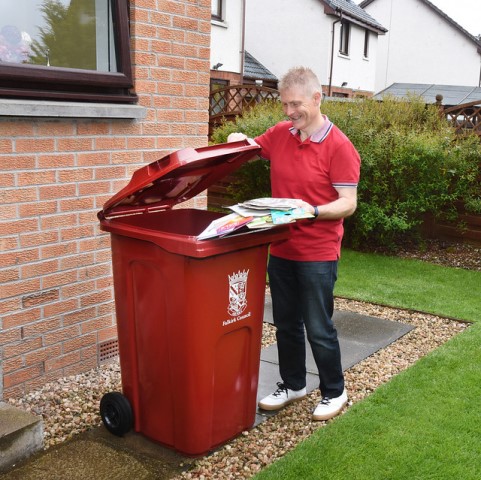
The Falkirk area is set to get a new bin this month to help improve recycling rates and the quality of waste recycled across the area.
The new container will be burgundy in colour and will take paper, card and cardboard leaving your blue bin for plastics, cans and cartons.
A four month roll out programme across all wards is planned and with residents separating waste at source (ie in the home), the Council can help generate more income and ensure the quality of the materials collected improves.
Information will be circulated to households in advance of their area having the new container introduced.
Councillor Paul Garner, spokesperson for the Environment said: “We already recycle nearly 56% of our material but we have national targets to meet of 70% by 2025. The new burgundy bin will mean by making sure we get a better quality of recycling we can reduce the amount sent to landfill as well as maximise any income for the council.
He added: “The new bin will be emptied every four weeks meaning in real terms there is no reduction in recycling capacity. We need everyone’s support to make this happen and would encourage them to find out more on the new recycling webpage.”
Lesley Scott, Waste Strategy Co-ordinator said: “The team have been working with Zero Waste Scotland for a while now in the run to the introduction of the new bin. We will be sharing information direct to householders as well as on social media. We would encourage employees, many of whom live in the Falkirk area, to share the information with friends and family so we are all ready to help make this a big success.”
Recycling facts
In 2018 8682 tonnes of recycled material were collected in Falkirk’s blue bins. This was made up from:
- 6408 tonnes of paper and cardboards that is reprocessed by UK paper mills
- 1417 tonnes of mixed plastics that is recycled into more plastic containers
- 370 tonnes of steel cans that, when reused, can make parts for cars, trains and ships
- In addition 4808 tonnes of food waste was collected and sent to a plant in Cumbernauld that turns the material into electricity and fertiliser used in agriculture